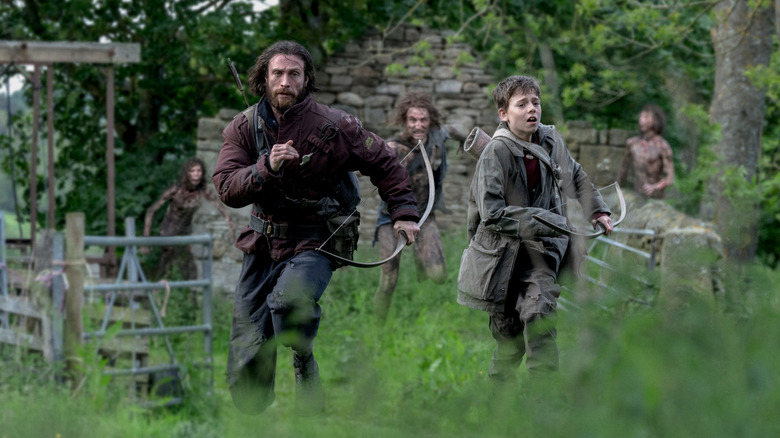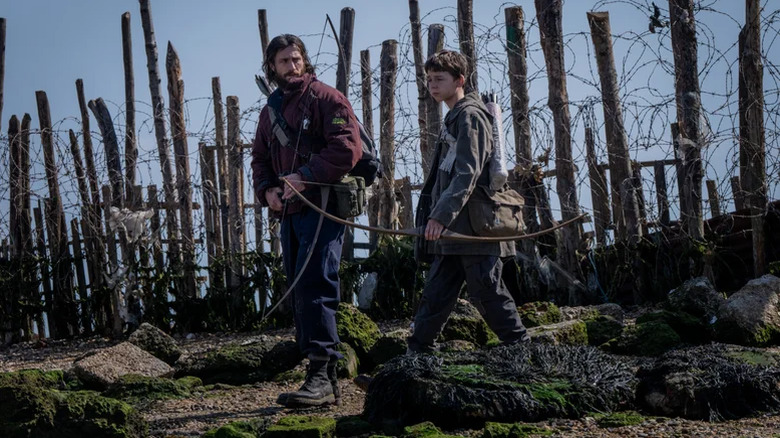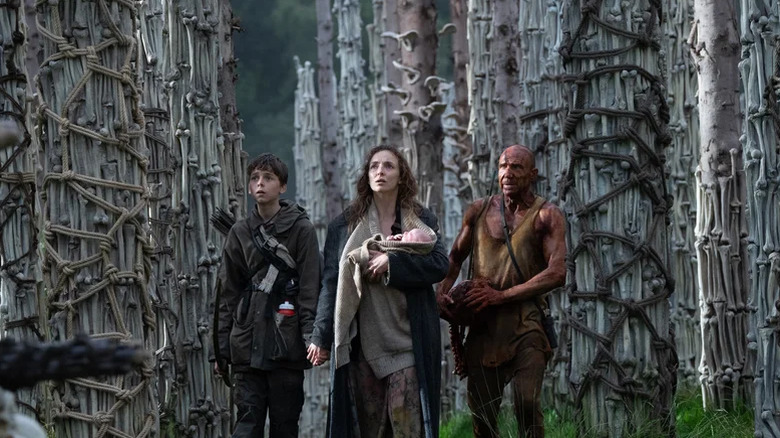The Original Version Of 28 Years Later Was A Completely Different Movie – And In A Different Language
23 years after they revolutionized the horror genre by modifying the undead for regular, fast moving people infected with a rage virus in "28 Days Later," Danny Boyle and Alex Garland returned to the zombie universe they created with "28 Years Later" — a movie Stephen King liked but wasn't scared by.
The two filmmakers have changed a lot in the two decades since their (not a) zombie movie, which makes "28 Years Later" a fascinating exercise in not trying to do the same thing again. As /Film's own Chris Evangelista described it in his review, the film is "a kind of sensory overload — the blend of violence, mixed-media, and a frequently jarring soundtrack swirl together with feverish effect." Indeed, as per his review, "28 Years Later" manages to be both scary and touching, an impressive, effective, and memorable horror sequel.
In "28 Years Later," we meet Spike (Alfie Williams) and his father Jamie (Aaron Taylor-Johnson) almost 30 years after the rage virus escaped from a bioweapons laboratory and ravaged the U.K. mainland, which has been quarantined by the rest of the world. The father-son duo lives on a small island only connected to the mainland via a narrow causeway that disappears with the high tide. Of course, one of them decides to venture into the mainland and quickly discovers a world descended into madness, and a virus that has mutated beyond their imagination.
In the years before "28 Years Later" was made, there were many ideas for what a third film in the series could be about. One of them, Alex Garland confesses, could have been a disaster — an entirely different movie in an entirely different language.
What if zombies, but it's about a clash of soldiers?
After "28 Weeks Later" was released in 2007 without either Boyle or Garland involved with the screenplay, fans started hoping the duo would revisit this universe with more stories. At some point, Garland started coming up with potential ideas for new movies set in the "28 Days" universe, considering even passing along writing duties to someone else. It wasn't until after COVID-19 that Garland started thinking of writing a screenplay himself for a third movie.
Speaking with Rolling Stone, Garland recounts one of the early ideas he had for another movie. The concept was to follow a group of military commandos who would break quarantine and reach the laboratory where the rage virus was originally created — in order to find a cure. Except, once they reached the lab, the commandos would find another group that had already gotten there first, and was trying to weaponize the virus. It was meant to be a movie with "shootouts and mass attacks and big, action-adventure-style set pieces." The first group, the ones trying to cure the virus, were going to be Chinese Special Forces, and the film was meant to be completely in Mandarin and subtitled.
"It was completely and utterly f***ing generic," Garland said, laughing, saying Danny Boyle effectively mocked his idea, before helping out and trying different ways of making the story work. "Finally, we both gave up on it. But oddly enough, writing something so generic was the freeing element to all of our problems. It gave us permission to have a totally blank slate."
28 Years Later is better than we could have imagined
The thought of making a zombie movie set in the U.K., where the heroes are Chinese soldiers trying to make a cure for a zombie-like virus, sounds, on paper, like an interesting idea. For one, it does feel like a great slap in the face of the anti-Asian hate that arose in the early days of COVID-19, plus the idea of a movie written by Alex Garland and potentially with a big director that was all in Mandarin is a cool thought experiment.
Still, it's easy to see how a sequel to a horror movie being a big action film with lots of soldiers would be quite boring and derivative, given that's exactly what "Aliens" did already 40 years ago. Instead, the movie we got is arguably the best case scenario for a sequel released over 20 years after the original. "28 Years Later" is a fantastic expansion of the ideas and the world of "28 Days Later," introducing wild concepts for the zombie genre that at times even resemble a secret adaptation of a horror story classic. The infected here, after so many years, have evolved further, and it seems they've even begun establishing communities, which is shocking and also one of the best zombie movie ideas in years.
But even just the main story, albeit simple (and in at least one way resembling the plot of "28 Weeks Later"), also hides a rather emotional story of accepting death in the face of absolute hell. It's a movie about how we confront our inevitable demise, and how that knowledge turns some people into violent lunacy, others into calm acceptance. There is no zombie movie quite like "28 Years Later," and that's because Garland took his time and decided not to go with his first instinct for it.


